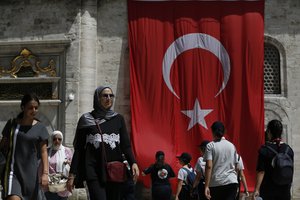Please tell us which country and city you'd like to see the weather in.

Chester
Coordinates: 53°11′25″N 2°53′30″W / 53.1903°N 2.8916°W / 53.1903; -2.8916
Chester (/ˈtʃɛstər/ CHESS-tər) is a walled city in Cheshire, England. Lying on the River Dee, close to the border with Wales, it is the largest and most populous settlement of the unitary authority area of Cheshire West and Chester, which had a combined population of 328,100 according to the 2001 Census, increasing to 329,608 at the 2011 Census. Chester was granted city status in 1541.
Chester was founded as a "castrum" or Roman fort with the name Deva Victrix, during the reign of the Emperor Vespasian in AD79. One of the three main army camps in the Roman province of Britannia, Deva later became a major civilian settlement. In 689, King Æthelred of Mercia founded the Minster Church of West Mercia, which later became Chester's first cathedral, and the Saxons extended and strengthened the walls, much of which remain, to protect the city against the Danes. Chester was one of the last cities in England to fall to the Normans. William the Conqueror ordered the construction of a castle, to dominate the town and the nearby Welsh border.

Chester (district)
Chester was a non-metropolitan local government district of Cheshire, England, with the status of a city and a borough.
Apart from Chester itself, which was the principal settlement, the district covered a large rural area. Other settlements included Malpas and Tarvin.
Creation
The district was formed on 1 April 1974, under the Local Government Act 1972, by the merger of the existing city and county borough of Chester with the Chester Rural District and Tarvin Rural District. The district council used the name Chester City Council.
City council
Membership and wards
The first council had 62 members and was elected as a shadow authority (known as Chester District Council) on 7 June 1973. The council came into its powers on 1 April 1974, on which date a royal charter and letters patent came into force with the authority becoming Chester City Council and the chairman of the council having the title of mayor. An election of the whole council was held again in 1976.
The number of councillors was reduced to 60 at the next council election in 1979. Thereafter the city council elections were "by thirds": with 20 councillors retiring in three out of every four years. In the fourth year, elections to Cheshire County Council took place.

Chester (Homeville, Virginia)
Chester is a historic home located near Homeville, Sussex County, Virginia. It was built in 1773, and is a two-story, three bay, frame dwelling with side gable roof. It features two exterior chimney stacks, joined on both the first and second floor levels by pent closets. Attached to the main section is a two-story wing with an exterior chimney and a shallow gable roof added in the 1820s.
It was listed on the National Register of Historic Places in 1970.
References
Radio Stations - Chester
SEARCH FOR RADIOS
Chester
ALBUMS
- Super Eurobeat, Volume 180 released: 2007
- I Love Disco Diamonds Collection, Volume 20 released: 2003
- Super Eurobeat, Volume 120: New Century Anniversary Non-Stop Megamix released: 2001
- Super Eurobeat, Volume 103 released: 2000
- Super Eurobeat, Volume 110: Millennium Anniversary Non-Stop Megamix released: 2000
- Super Eurobeat, Volume 94 released: 1999
- Super Eurobeat, Volume 91 released: 1998
- Super Eurobeat, Volume 88 released: 1998
- Rolling Stone: New Voices, Volume 25 released: 1998
- Ooh Do I Love You: A Benefit to End Sexual Violence released: 1996
- Super Eurobeat, Volume 54 (extended version) released: 1995
- Super Eurobeat, Volume 50: Anniversary Non-Stop Mix - Greatest Euro Hits 50! released: 1994
- Maharaja Night Hi-NRG Revolution, Volume 11 released: 1994
- Super Eurobeat, Volume 6 released: 1994
- Super Eurobeat, Volume 2 released: 1994
- Super Eurobeat, Volume 40: Anniversary Nonstop Edition released: 1993
- Super Eurobeat, Volume 36: Non Stop Mega Mix - King & Queen Special released: 1993
- Super Eurobeat, Volume 35 (extended version) released: 1993
- Maharaja Night Hi-NRG Revolution, Volume 8 released: 1993
- Super Eurobeat, Volume 29 released: 1992
- The Best of Italo Disco, Volume 10 released: 1988
- European Maxi Single Hit Collection, Volume 17 released: 1986
Super Eurobeat, Volume 180
Released 2007- Mickey Mouse March (Eurobeat Version)
- Ike Ike
- Mikado
- Dancer
- velfarre 2000
- Speedway
- I Can Be Your Dee Jay
- Popteen
- The Final Countdown
- Stay The Night
- Dance In The Fire
- Ganguro
- Made for Loving You
- Killer
- Fire Fire Fire
- Crazy For Love
- Caballero With Sombrero
- Johnny Go
- Incredible Love
- Express Love
- Hot Vampire
- Give Me Heart & Soul
- Wanna Be Your Emotion
- Sunday
- Let The Rain
- Horror Fantasy
- Dance and Party
- Not For Sale
- Fightin' Over Freedom
- Tsunami Comes
- Terminator
- Touch and Go
- Pilot Is The Hero
- Boogie Boogie
- Don't Make Me Cry
- Emotions
- Without You
- Let's Go, Come On
- Viva The Night
- Now and Forever
- Bugabuga Chew Chew
- Shock Out
- Looka Bomba
- Like A Fire
- Disco Energy
- Bad Bad Bad
- Cherry Girl
- Crash Boom Burn Me Up
- Power
- 180
Super Eurobeat, Volume 120: New Century Anniversary Non-Stop Megamix
Released 2001- Dancer
- Dancing Crazy
- Onto the Beat of My Bang! Bang!
- Electric Power
- You Can Light My Fire
- Goin' On
- When I Close My Eyes
- Be My Babe
- Love and Fire
- Boom Boom Para Para
- Tokyo Tokyo
- Let Me Be Your Baby
- Round n' Round
- Give Me Five
- I Love Spaghetti
- Cocoon
- All Right - Hey Hey
- Shame on You
- Maharaja Night
- Bye Bye Baby
- Breakdown
- Super Sex Symbol
- Hot Love & Emotion
- Ciao Ciao Babe
- What Is Real
- Heart Breaker
- Dark in the Night
- Love Is Danger
- Harmony
- He-Hey Dancin'
- You Need a Lover
- Babe Follow Me
- Din Don Dan
- Money Go!
- Heartbeat
- Music Fever (feat. Mr. M)
- Looking for Love
- Give Me Heart & Soul
- I Believe in You
- Red Hot Zip
- Winnie the Pooh (Eurobeat version)
- Shy Gun
- No One Sleep in Tokyo
- Take Me Now
- Feeling the Night
- I Can Be Your Dee Jay
- Captain Fantastic
- DJ Baam! Baam! Play the Boom Boom!
- Listen to Eurobeat
- Hot Vampire
Super Eurobeat, Volume 103
Released 2000- Jealousy
- Down Down
- I Wanna Be Your Lover
- Mon Amour
- The Power of Life
- Killer Queen
- Live in Tokyo
- Dancer
- A Song for You
- You Really Are the Man I Love
- Supernight
- If You Wanna Stay
- Don't Breaking My Heart
- Lucky Man
- Lovable Love
- The Power of Gasoline
- Stay the Night
- Survival Dance ~ No No Cry More ~ (Eurobeat mix)
Super Eurobeat, Volume 110: Millennium Anniversary Non-Stop Megamix
Released 2000- Is for You
- Only You
- Help Me
- Open Your Heart
- What Kind of Cure
- Black Power
- Wild Reputation
- Are You Ready
- Soul Gasoline
- Hot Fire
- Fantasy
- Loving Honey
- Up and Down
- Bad Love
- Dark in the Night
- King and Queen
- Fun Fun Boy (feat. Annalise & Virginelle)
- You Got Me Going Crazy
- Sound of My Heart
- Heart Breaker
- Love Is Danger
- Halloween
- Let’s Make Love
- Memories
- Megaton Man
- Atomic Playboy
- Kiss Me Kiss Me Babe
- Africa
- Bang Bang for Your Love
- Superman
- You Really Touch Me Now
- Highway Star
- Kamikaze
- Sugar Baby
- Hurricane
- Extasy
- Try Me
- Doctor Doctor
- Nobody Knows
- Mystery in Love
- You’re My Destiny
- No Choice at Random
- New Day
- Back to the Future
- Seventies
- Harmony
- Livin’ in America
- Coo Coo Love
- New Love
- Tora Tora Tora
Ooh Do I Love You: A Benefit to End Sexual Violence
Released 1996- Ooh Do I Love You
- Dear Josie Love Robyn
- Capsella Love
- Exit: Love Blinders
- The Love You Save
- Driving on Redline 3 Miles and Counting
- Better Friends
- Love Carousel at 90 Degrees
- Soy Sauce Love
- Tadzhikistan Love
- Love of Helen
- Love Is the Substance
- I Love a Parade
- I Love
- HK Love
- Slovenia
- Evol:Love
- Lately How I Love You
- Quando Mi Amor
Super Eurobeat, Volume 54 (extended version)
Released 1995- Wake Up Honey (extended mix)
- Shake Down (extended mix)
- Blowing in the Wind (extended mix)
- Somebody to Love (extended mix)
- I Say Stop (extended mix)
- Move Your Body (extended mix)
- Please Me Tell Me Why (extended mix)
- Bad Boy (extended mix)
- You Better Bring Your Love (extended mix)
- Gonna Be All Right (extended mix)
- Come to My Arms (extended mix)
- Demolition Man (extended mix)
- Bang Bang (extended mix)
Maharaja Night Hi-NRG Revolution, Volume 11
Released 1994- Gorky Park (extended mix)
- Harmony (extended mix)
- Always on My Mind (extended mix)
- Under Pressure (extended mix)
- Dance the Nation (extended mix)
- High Control (extended mix)
- Playtime (extended mix)
- In My Dreams (extended mix)
- Babe Follow Me (extended mix)
- I'm on Fire (extended mix)
- Got to Feel It (extended mix)
- Ever and Ever (extended mix)
- Why Not (extended mix)
Super Eurobeat, Volume 40: Anniversary Nonstop Edition
Released 1993- Sugar Baby
- Babe C'Mon
- You Are the Number One
- O.K.! All Right!
- Domino Dancing
- Mine Is Your Love
- Feel the Passion
- Broken Heart
- Stop the Music
- I Wanna Shout
- You Really Touch Me Now
- Behind You
- Wanted
- Dance for Joy
- Ready for You
- Bang Bang for Your Love
- Kiss Me Kiss Me Babe
- Lady Night
- Mystery in Love
- He-Hey Dancin'
- Heroes
- Everybody Let's Dance
- Let's Make Love
- Sledge Hammer
- Make Love
- Shotgun Killer
- Everybody's Dancing
- Kamikaze
- Africa
- Master Blaster
- Starfighter
- Love Is Danger
- Take Me Up & Down
- Superman
- One for You-One for Me
- Hey Hey
- Bye Bye Baby
- Give Me the Night
- Stranger
- Hot Love & Emotion
Super Eurobeat, Volume 35 (extended version)
Released 1993- Sweet Lover (extended mix)
- Love Is Danger (extended mix)
- Dance in the Night (extended mix)
- Valentina Mon Amour (extended mix)
- Cannibal Man (extended mix)
- Bang Bang for Your Love (extended mix)
- Kiss Me Kiss Me Babe (extended mix)
- Hold On (extended mix)
- Passion Hot Emotion (extended mix)
- Sing Song (extended mix)
- Superman (extended mix)
- Mega Love (extended version)
- Ciao Ciao Babe (extended mix)
Maharaja Night Hi-NRG Revolution, Volume 8
Released 1993- Take This Time (dance mix)
- I Got to Feel Your Love (extended mix)
- All Your Love (dance mix)
- Planet of the Warriors (Warriors extended mix)
- Stop Me (extended mix)
- Lesson to Love (extended mix)
- Rocking the City (extended mix)
- Feel the Heat (extended mix)
- Take Me High All Days (extended mix)
- Laser Game (extended mix)
- Hide Away (extended mix)
- Are You Ready to Fly (extended mix)
- Don't Tell Me Lies
Chester
ALBUMS
- Acestea sunt două lucruri care mă enervează cel mai tare released: 2007
Chester
ALBUMS
- No Light Here released: 2001
- Malpleasurability released: 1999
No Light Here
Released 2001- Nothing 2
- I'm in Love With Someone
- Monkeys
- Charlie Harper
- Scar / Guitar
- I Set Fire to My Girlfriend's Cat
- I Wouldn't Trust You With a Pint of Lager
- Before I Had a Girlfriend
- Girl Called Summer
- Happiest Day
- Tickle Me Emo
- Voodoo Man From Planet X
- Fuckin' Party
- Back in the Night
- Goth Classic
- Sincere
- There Is No Light Here
- Lime and the Coconut
Chester
ALBUMS
- Sunset Dreams 1 released: 2008
- Arrested in Russia - Tribute to Rancid released: 2008
- :min [musik:in:nrw] released:
Sunset Dreams 1
Released 2008- Get Ready to Fly (single edit)
- Passage to Arabia (single edit)
- Exploring Unknown Places (single edit)
- Freedom of Nature (single edit)
- White Land (single edit)
- Every Little Star (single edit)
- Solar Winds (single edit)
- Sky (single edit)
- Ritmo Del Mar (single edit)
- Burning Earth (single edit)
- Lonely Peer (single edit)
- Robert's City (single edit)
- After the Night (single edit)
- Beautiful Sunset (single edit)
- Come Down (single edit)
- Rocket Power (single edit)
- Space of the Stars (single edit)
- Escape (single edit)
- Deep Pulsation (single edit)
- Contact (single edit)
Arrested in Russia - Tribute to Rancid
Released 2008- Roots Radicals
- Ruby Soho
- Loki
- Ivory Coast
- Poison
- Indestructible
- Animosity
- Django
- Otherside
- Hooligans
- Start Now
- Axiom
- Outta My Mind
- Time Bomb
- Radio
- Name
- As Wicked As
- I Wanna Riot
- The Brothels
- Nihilism
- Listed M.I.A.
- Fall Back Down
- Avenues & Alleyways
- Rwanda
- Bloodclot
- Old Friend
- Radio Havana
- Back Up Against the Wall
- Arrested in Shanghai
- I Am Forever
Chester
ALBUMS
- Cocktail molotov released: 2011

Chester
Coordinates: 53°11′25″N 2°53′30″W / 53.1903°N 2.8916°W / 53.1903; -2.8916
Chester (/ˈtʃɛstər/ CHESS-tər) is a walled city in Cheshire, England. Lying on the River Dee, close to the border with Wales, it is the largest and most populous settlement of the unitary authority area of Cheshire West and Chester, which had a combined population of 328,100 according to the 2001 Census, increasing to 329,608 at the 2011 Census. Chester was granted city status in 1541.
Chester was founded as a "castrum" or Roman fort with the name Deva Victrix, during the reign of the Emperor Vespasian in AD79. One of the three main army camps in the Roman province of Britannia, Deva later became a major civilian settlement. In 689, King Æthelred of Mercia founded the Minster Church of West Mercia, which later became Chester's first cathedral, and the Saxons extended and strengthened the walls, much of which remain, to protect the city against the Danes. Chester was one of the last cities in England to fall to the Normans. William the Conqueror ordered the construction of a castle, to dominate the town and the nearby Welsh border.
Latest News for: chester fc
New community publication from Chester FC Community Trust
Jurgen Klopp drops massive hint over Daniel Sturridge’s future
Super League team news - Hull KR, Warrington, Leeds, Widnes, Wakefield and Hull FC wrapped up
Foyle Cup fixtures and Wednesday results: Aaron has decisive say as Trojans stride ahead
John Barnes makes surprise Mo Salah admission and wants two new Liverpool signings
Daniel Sturridge Drops Huge Hint Regarding Future After Impressive Pre-Season Display
LFC 7-0 Chester FC: Goals, highlights and more
Liverpool open talks over signing Jack Grealish from Aston Villa
Jordan Henderson reveals texts from Jurgen Klopp during England’s World Cup campaign
Daniel Sturridge drops strong hint over Liverpool future
LIVE: Chester FC v Liverpool - follow the build-up
Loris Karius fumbles ball into his own net before Liverpool’s pre-season friendly
Watch live: Liverpool v Chester FC - 2pm BST on Saturday
- 1
- 2
- 3
- 4
- 5
- Next page »
News Search
Most Viewed
WorldNews.com | 16 Aug 2018
WorldNews.com | 16 Aug 2018
WorldNews.com | 16 Aug 2018
WorldNews.com | 16 Aug 2018
WorldNews.com | 16 Aug 2018

















